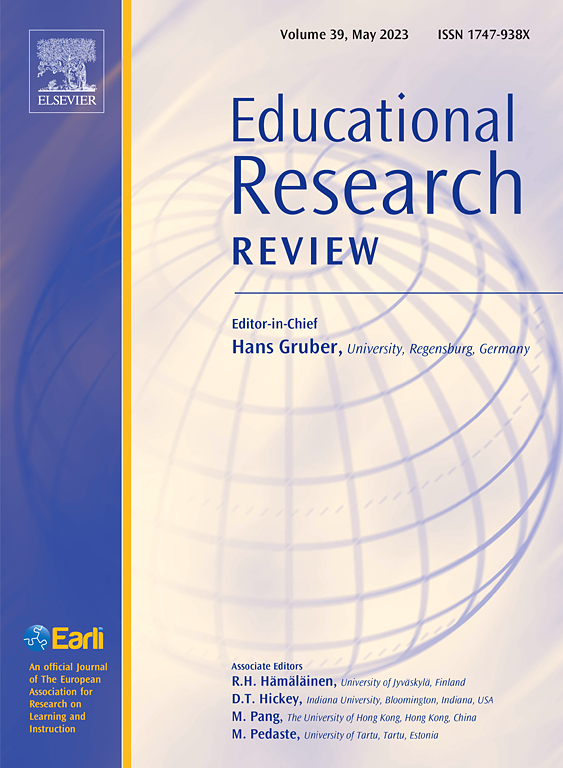The effect of problem-based learning approach on learning outcomes: A second-order meta-analysis study
IF 10.6
1区 教育学
Q1 EDUCATION & EDUCATIONAL RESEARCH
引用次数: 0
Abstract
The effect of the problem-based learning method on learning outcomes has been studied in various studies over the years. The fact that there are many meta-analyses on this subject in the literature requires determining how the method affects cognitive and affective learning outcomes. Therefore, this study aimed to reveal the effect of the problem-based learning method on students' cognitive and affective learning outcomes. In addition, the effect of the method on learning outcomes was examined in terms of moderators such as study type, study quality, and subject area. The effect sizes obtained from the primary meta-analyses were interpreted through a second-order meta-analysis method covering a 30-year period. A total of 36 datasets from 22 primary meta-analysis studies were included in the analysis within the scope of inclusion and exclusion criteria. The mean effect of studies combined under a random-effects model in the study was calculated as g = 0.726, 95 % CI [0.587; 0.865]. This result means that problem-based learning has a greater effect on students' cognitive and affective learning outcomes than other methods. In addition, the results indicate that study quality is a significant moderator, with low-quality studies producing a larger effect size.
基于问题的学习方法对学习结果的影响:一项二阶元分析研究
多年来,各种研究都在研究基于问题的学习方法对学习结果的影响。事实上,文献中有许多关于这一主题的荟萃分析,需要确定该方法如何影响认知和情感学习结果。因此,本研究旨在揭示基于问题的学习方法对学生认知和情感学习结果的影响。此外,根据研究类型、研究质量和学科领域等调节因素,研究了该方法对学习成果的影响。从初级荟萃分析中获得的效应量通过覆盖30年的二阶荟萃分析方法进行解释。在纳入和排除标准范围内,共有来自22项主要荟萃分析研究的36个数据集被纳入分析。在随机效应模型下合并研究的平均效应计算为g = 0.726, 95% CI [0.587;0.865]。这一结果意味着基于问题的学习比其他方法对学生的认知和情感学习结果有更大的影响。此外,研究结果表明,研究质量是一个显著的调节因素,低质量的研究产生更大的效应量。
本文章由计算机程序翻译,如有差异,请以英文原文为准。
求助全文
约1分钟内获得全文
求助全文
来源期刊

Educational Research Review
EDUCATION & EDUCATIONAL RESEARCH-
CiteScore
19.40
自引率
0.90%
发文量
53
审稿时长
57 days
期刊介绍:
Educational Research Review is an international journal catering to researchers and diverse agencies keen on reviewing studies and theoretical papers in education at any level. The journal welcomes high-quality articles that address educational research problems through a review approach, encompassing thematic or methodological reviews and meta-analyses. With an inclusive scope, the journal does not limit itself to any specific age range and invites articles across various settings where learning and education take place, such as schools, corporate training, and both formal and informal educational environments.
 求助内容:
求助内容: 应助结果提醒方式:
应助结果提醒方式:


